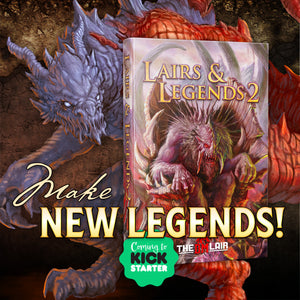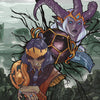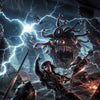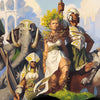New D&D & PF2e Reputation and Faction Favor System
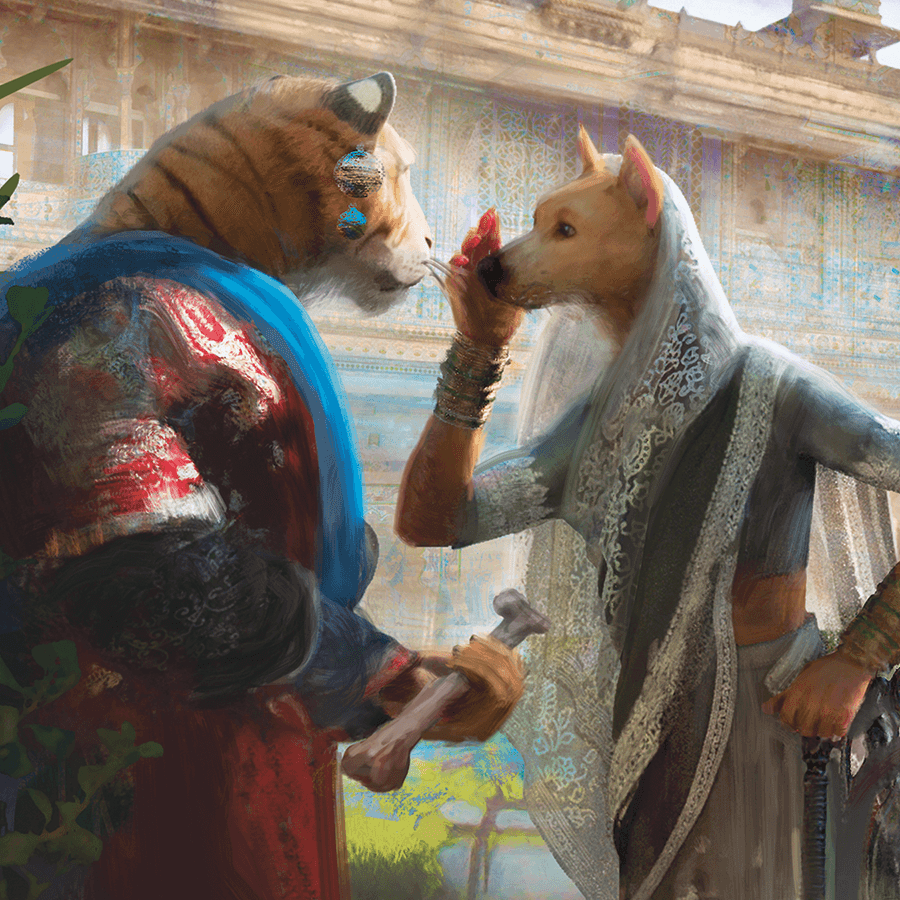
Written by Luke Hart
I love introducing new groups, factions, and organizations in my games. It adds depth to the world and makes the game more fun for players. However, it causes its own problems.
For instance, in my Pathfinder 2 Eberron game, my players have now encountered the following factions: House Kundarak, the Halflings of Lowbrook, the Jhorash’tar Orcs, the Dwarves of Frostmantle, the Droaamites, the Emerald Claw, the followers of Dyrrn the Corrupter, House Jorasco, priests of the Sovereign Host, and cultists of the Dark Six. That was all by level 3, so you could say I have a bit of an addiction here—an addiction to introducing new and interesting groups for my players to interact with.
Now, that makes the game more dynamic and fun, yes, but it also complicates matters a bit. You see, not only have I added all those factions to the mix, but most of them have their own individual NPCs as members, which, of course, makes sense. Groups are composed of people, after all.
So, the problem or complication I’ve found when I have so many factions and NPCs in the game is that I now have to determine how each interacts with the characters. But not just that. Since character relationships with factions and individual NPCs are dynamic, I have to adjudicate how actions affect those relationships and then remember where the characters stand with each faction and NPC.
Furthermore, I need to know how that relationship, good or bad, affects the group’s or NPC’s behavior toward the characters. This is the complicated web we game masters often weave for ourselves, isn’t it.
So, a couple of years back, I created a reputation system to use in my games. This system helps track the characters’ standing with factions and individual NPCs and roleplay those factions and NPCs better at the table, creating a bit of order out of the chaos.
As you may have guessed, I will be going over the ins and outs of this reputation and favor system in the article today. It’s compatible with virtually any game system—D&D, Pathfinder 2, and whatnot—and my team and I have refined the original version to make it even better.
Now, if you want to save yourself the hassle of taking notes and getting all the charts and tables in the reputation system, you can pick up Friends and Foes: A Reputation System on the DM Lair store.
Watch or listen to this article by clicking the video below.
OK, let’s get into the meat of the reputation system!
Reputation in General
First, four levels of reputation get tracked: global reputation, major location reputation, group reputation, and individual reputation. We’ll go over each in more detail, but you start at the top and work your way down. Characters will always have a global reputation; they’ll probably develop a reputation at major locations where they spend a bit of time. Depending on how much they interact with specific entities, they may or may not have group or individual reputations. If the characters don’t have a reputation with a group such as the Sovereign Host, that group will use the characters’ major location or global reputation to determine how they interact with them. They simply have nothing else to go on.
Reputation Scale
The system uses a reputation scale.

So, if my characters are constantly thwarting the Sovereign Host, they will perceive them as bad guys, and they’ll have a negative reputation with them even though my players’ characters are, in fact, good characters who generally do good in the world.
Characters always start with a reputation of zero—that’s basically neutral—and then their reputation increases or decreases based on their behavior in relation to the world as a whole, the major location, group, or individual. Increasing or decreasing reputation can be left to the game master’s judgment, but some specific actions can increase or decrease reputation. It would be too tedious to list them all in this article, but we have included them in the published version, Friends and Foes: A Reputation System.
Then, as the characters’ reputation improves, the scale goes up, likely into the positive numbers, +2, +5, +8, etc.; as their reputation decreases, the scale goes down, even into the negative numbers, -2, -5, etc. The characters’ reputation score with a location, group, or individual determines how that entity perceives and treats them, which we have specific rules fleshed out for, though you can also just wing it, of course.
And that’s basically the gist of the system at a high level. Now, we’ll go into detail about the different levels of reputation.
Global Reputation
Global reputation forms the base of the pyramid and serves as the foundation from which the world sees the characters. Global reputation tends to change slowly and may not change at all for the characters’ first few levels. It takes time for word to spread about them, and low-level heroes’ deeds are often not grand enough to cause immediate global renown. Instead, most adventurers will start building global renown by reaching a certain level of notoriety in one or more places, which will, in turn, cause word of their deeds to spread.
Things that affect global reputation include having a negative or positive reputation with major locations or groups, committing acts of great evil or heroism, and the like.
Now, global reputation isn’t something the characters benefit from directly, though it influences their reputation at the other levels. While characters can ask for favors and gain favorable pricing from having a particularly high reputation with a major location, they cannot get that by virtue of their global reputation alone. Instead, a high global reputation will raise the characters’ reputations at other levels, contributing to the benefits they attain.
Benefits of having a high or low global reputation include other reputation levels increasing or decreasing and even groups and NPCs attacking the characters on sight.
Major Location Reputation
Major locations represent the bread and butter of most campaign settings. These include capital cities, major trade hubs, and powerful population centers. Often, these locations are closely related to nearby minor locations and have various groups operating within their borders. While it is far faster and easier to gain (and lose) reputation in a major location than it is globally, it still isn’t a quick thing to improve—though it is easy to lose when engaging in true evil within their walls.
Things that affect major location reputation include reaching different levels of reputation with groups or important NPCs in the area and directly aiding or harming the location.
The characters’ reputation in a major location will pay dividends more directly than a global reputation; however, the biggest benefits are still how it changes the perception of individuals and groups in the area. Characters can earn a price reduction, special accommodation in the city, or even a one-time reward as recognition for their deeds. However, keep in mind that even within a good-aligned city, there are likely to be evil-aligned merchants and individuals who may see the characters’ reputation in the opposite light to the rest of the populace. Now, with a negative location reputation come consequences such as warrants for arrest or even “dead or alive” posters.
You’ll probably find that the characters’ major location reputation has the most effect on gameplay, though, in my games, group reputation takes the cake, mostly because of how I run them.
Group Reputation
Groups are the various organizations the characters will come into contact with regularly. They range from merchant guilds to city watches to criminal organizations. Sometimes, they may serve as party patrons—like House Kundarak does in my Pathfinder 2 campaign—sponsoring the characters and sending them on missions; other times, they are simply an organization the characters have to deal with regularly. The Emerald Claw or Dyrrn the Corrupter falls into that category for my PF2 players. How you use groups probably varies greatly, but you’ll probably find that they are one of the main driving forces in your campaign—I know they are in mine.
Group reputation is gained by assisting a group and its members, or at least by making friends with them. It’s easy to gain and lose reputation among a group because they tend to be relatively small, and word travels quickly through their ranks. It wouldn’t be surprising for the characters to reach maximum or minimum reputation with a group in relatively short order if they’re dedicated to aiding the group and its members. However, it’s equally possible to lose their reputation just as quickly; after all, if you harm a group member, word will reach all the others far quicker than it would if you harmed a random citizen in the city.
Things that can affect group reputation include completing quests for the group, assisting allies or enemies of the group, or generally aiding or harming the group or its members.
OK, this is the reputation level where the characters start to see the most direct and tangible rewards or penalties. Examples include receiving favors or discounted prices or paying increased prices, such as for work done by members of a certain guild. As reputation increases, the group might give out quests with better rewards, or in the case of negative reputation, the group might start actively opposing the characters’ efforts or even send hit squads after them.
An interesting thought to consider: If the characters continually fail or disappoint a patron, such as House Kundarak, they may send them on a suicide mission with the hope of just getting rid of them. After all, they wouldn’t want their guild secrets getting out, would they? Just firing a group of misfits could put them in a compromised situation.
Individual Reputation
Individual reputation is fairly self-explanatory; rather than talking about groups or locations or the entire world, this is the characters’ reputation on a direct, personal level. Unlike the other reputation levels discussed thus far, individual reputation depends just as much on how the characters treat people as it does on quests and other actions. Individual reputation is also the fastest to gain—people can become fast friends when they connect in a meaningful way—but also the fastest to lose.
However, it would be foolish to think that the sometimes-fleeting nature of individual reputation means it’s any less important than the others. In fact, it would not be a stretch to argue that individual reputation is the most important because it has the most direct mechanical benefits to the characters, which can apply in every situation. After all, a high reputation in an entire kingdom is great, but having advantage on checks to persuade the king personally is even better.
The characters might gain or lose individual reputation for things such as completing or failing a task or succeeding or failing a Charisma check with the NPC.
Now, the effects of individual reputation are as varied as the individuals themselves. Merchants, for example, might offer better or worse prices when selling goods, while a tavern owner will offer better or worse deals on rooms or perhaps juicier gossip. More than any other type, individual reputation provides the characters with the benefits of friends that help them or the detriment of enemies that oppose them.
However, be careful not to try to track individual reputation for every NPC the characters happen to run across. That would get complicated fast. Instead, just track reputation for important characters in the campaign or those that appear most often.
Tracking Reputation
Generally speaking, all you need to track reputation is a simple chart like this one.
![]()
You’ll definitely want to track global reputation and major location reputation. However, for groups, I would only track reputation for those groups you’ve decided will play a major role in the campaign. And really, the same for individuals. If you try to track too much, you’ll lose your mind.
Friends and Foes: A Reputation System
If you think this reputation system might be handy in your games, don't forget that you can get Friends and Foes: A Reputation System on the DM Lair store. It includes all of the details, including all of the tables the system uses.
The system provides a structured method for tracking and determining how individuals, groups, and the world at large perceive the characters in an adventuring group. Versions for both 5e and Pathfinder 2 are included, and it can easily be adapted for almost any other RPG!
Topics and Contents:
- Using the Reputation System
- Reputation in General
- Global, Major Location, Group Reputation, and Individual Reputation
- Tracking Reputation
-
Posted in
Game Master How-To Articles


